
Fibers
Scope & Guideline
Championing Open Access in Materials Science
Introduction
Aims and Scopes
- Fiber Reinforcement in Construction Materials:
Research into the use of various fiber types, such as carbon, glass, and natural fibers, to enhance the mechanical properties and durability of concrete and other construction materials. - Advanced Fiber Processing Techniques:
Innovations in fiber production methods, including electrospinning, blow spinning, and 3D printing of fiber-reinforced materials, aimed at improving the functionality and performance of fibers. - Sustainable and Eco-Friendly Fibers:
Exploration of biodegradable and sustainable fibers, particularly those derived from natural sources, and their applications in reducing environmental impact. - Nanofibers and Their Applications:
Focus on the fabrication and application of nanofibers in diverse fields such as drug delivery systems, filtration, and advanced composites. - Fiber Characterization and Modeling:
Studies on the mechanical, thermal, and structural characterization of various fiber types and the application of computational models to predict their behavior in different environments.
Trending and Emerging
- Smart and Functional Fibers:
Research on fibers that incorporate smart technologies, such as sensors and conductive materials, is on the rise, driven by demand in wearable technology and smart textiles. - Recycling and Upcycling of Fibers:
An increasing number of studies focus on the recycling and upcycling of waste fibers and materials, highlighting sustainability in fiber production and usage. - Bio-Based and Biodegradable Fibers:
There is a growing interest in developing bio-based fibers and biodegradable composites, reflecting a broader industry trend towards sustainability and environmental responsibility. - Nanotechnology in Fiber Development:
The application of nanotechnology in fiber development, including the integration of nanomaterials to enhance fiber characteristics, is becoming a prominent theme in recent research. - Hybrid Fiber Composites:
The exploration of hybrid composites that combine different types of fibers to optimize mechanical properties and performance is gaining traction in the literature.
Declining or Waning
- Traditional Textile Applications:
Research focused solely on conventional textile applications is decreasing as more emphasis is placed on functional and technical textiles that offer enhanced properties. - Non-Eco-Friendly Fiber Processing Methods:
There is a noticeable decline in studies that promote traditional, non-sustainable fiber processing methods, as the industry shifts towards greener technologies. - Basic Fiber Properties without Advanced Applications:
Papers that discuss basic mechanical properties of fibers without linking them to advanced applications or innovative uses are becoming less common.
Similar Journals
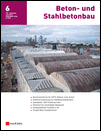
Beton- und Stahlbetonbau
Transforming Ideas into Concrete SolutionsBeton- und Stahlbetonbau is a renowned journal published by ERNST & SOHN, dedicated to advancing knowledge in the field of building and construction, particularly focusing on concrete and reinforced concrete engineering. Established in 1969, this peer-reviewed publication encompasses a broad range of topics, including innovative construction methods, structural analysis, and material performance, making it a crucial resource for researchers, scholars, and industry professionals alike. With an impact factor ranking it within the Q2 category in the Building and Construction field, this journal holds significant influence, evidenced by its Scopus rank of #112/223. Importantly, Beton- und Stahlbetonbau is committed to providing high-quality content that meets the academic rigor demanded by its audience, ensuring that readers remain at the forefront of technological advancements and research in concrete construction.

COMPOSITES PART A-APPLIED SCIENCE AND MANUFACTURING
Unleashing Potential in Composite TechnologiesCOMPOSITES PART A-APPLIED SCIENCE AND MANUFACTURING, published by Elsevier Science Ltd, is a premier international journal that serves as a vital platform for the dissemination of high-impact research and innovation in the fields of composite materials and manufacturing technologies. With an impact factor that reflects its outstanding reputation, this journal is categorized in the Q1 quartile for both Ceramics and Composites and Mechanics of Materials, positioning it among the top journals in these disciplines. It holds impressive ranks in Scopus, specifically Rank #16 out of 398 in Engineering - Mechanics of Materials and Rank #10 out of 127 in Materials Science - Ceramics and Composites, reinforcing its authoritative stance in the field. Spanning from 1996 to 2024, the journal features a wide array of research articles, reviews, and case studies that collectively enhance understanding and foster advancements in composite materials. With an open access model facilitating wide dissemination, COMPOSITES PART A is indispensable for researchers, professionals, and students striving to push the boundaries of materials science and engineering.
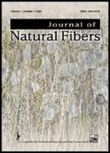
Journal of Natural Fibers
Advancing Knowledge in Natural Fiber InnovationJournal of Natural Fibers is a pioneering open-access academic journal, published by Taylor & Francis Inc, that focuses on the emerging and multidisciplinary field of natural fibers. Established in 2004, the journal aims to advance the understanding and application of natural fibers in various industries, including materials science, textiles, and biocomposites. With an impressive impact factor and ranking in the 74th percentile among materials science journals, it is classified as Q2 in materials science (miscellaneous) as of 2023. The journal encourages innovative research and provides a platform for scientists, researchers, and professionals to share their findings in a rapidly evolving field. Notably, since 2023, it has embraced an open-access model, enhancing the accessibility of cutting-edge research to a broader audience. With contributions from a diverse range of countries and a commitment to high-quality peer review, the Journal of Natural Fibers is essential for those looking to explore the sustainable potentials and technological advancements of natural fibers.
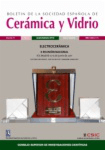
BOLETIN DE LA SOCIEDAD ESPANOLA DE CERAMICA Y VIDRIO
Exploring Innovations in Materials Science and EngineeringBOLETIN DE LA SOCIEDAD ESPANOLA DE CERAMICA Y VIDRIO, published by Elsevier, is a premier open-access journal dedicated to advancing research in the fields of Ceramics and Composites, Industrial and Manufacturing Engineering, and Mechanics of Materials. With an impressive impact factor and a strong ranking within its categories—Q2 in 2023 for multiple engineering domains—it serves as a vital resource for academics, industry professionals, and students alike. The journal has embraced an open-access model since 2015, providing widespread accessibility to the latest findings and innovations in ceramic and glass sciences, thus encouraging collaboration and knowledge sharing within the global research community. Published quarterly, and with a focus on interdisciplinary applications, the BOLETIN DE LA SOCIEDAD ESPANOLA DE CERAMICA Y VIDRIO is not only influential in shaping research agendas but also essential for anyone engaged in the evolving landscape of materials science.
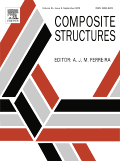
COMPOSITE STRUCTURES
Unveiling Breakthroughs in Advanced Material ScienceComposite Structures, published by Elsevier Science Ltd, is a premier academic journal that has been at the forefront of research in the fields of Ceramics and Composites and Civil and Structural Engineering since its inception in 1983. With a remarkable Q1 ranking in both categories for 2023, it is recognized as one of the leading publications, occupying the 22nd position in Civil and Structural Engineering and the 14th in Materials Science, showcasing its high-impact contributions to the respective fields. The journal serves as a crucial platform for disseminating cutting-edge research, innovative methodologies, and comprehensive reviews that cater to the academic and professional community. Although it does not offer open access options, its robust impact factor and extensive reach through Scopus ensure that the articles published are widely cited and serve as valuable resources for enhancing the understanding of composite materials and structures. The journal invites contributions that push the boundaries of knowledge, making it an essential read for researchers, engineers, and students invested in advanced materials and structural applications.
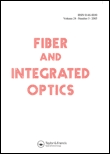
FIBER AND INTEGRATED OPTICS
Discovering New Dimensions in Optical ResearchFIBER AND INTEGRATED OPTICS is a prominent academic journal published by TAYLOR & FRANCIS INC, focusing on the cutting-edge domains of optical and fiber technologies. Since its inception in 1977, the journal has journeyed through expansive developments in the fields of Atomic and Molecular Physics, as well as Electronic, Optical, and Magnetic Materials, boasting a converged publication history extending to 2024. With a solid reputation reflected in its Q3 rankings in both aforementioned categories, FIBER AND INTEGRATED OPTICS serves as an essential platform for researchers, professionals, and students to disseminate and explore innovative findings and methodologies. Although currently not offering Open Access, its scholarly contributions remain invaluable, fostering a deeper understanding and advancements in fiber optic applications and integrated optical systems. Situated in the United Kingdom, the journal continues to attract a diverse global audience, solidifying its significance in contemporary scientific discourse.

Advances in Civil Engineering Materials
Transforming Infrastructure Through Advanced MaterialsAdvances in Civil Engineering Materials, published by the American Society for Testing and Materials, is a leading journal in the field of civil engineering, specializing in the innovative applications and developments of materials used in construction and infrastructure. With an ISSN of 2379-1357 and an impressive lineup of contributions from renowned researchers, this journal serves as a pivotal platform for disseminating groundbreaking research from 2012 to 2024, currently enjoying a category quartile ranking of Q2 across multiple disciplines including Ceramics and Composites, Civil and Structural Engineering, and Materials Chemistry. Though it operates under a subscription model, the valuable insights and advancements presented in the journal have a significant impact on both academia and industry practices. Researchers, professionals, and students are invited to explore the evolving landscape of civil engineering materials, gaining critical knowledge to drive innovations and contribute to the sustainability and safety of architectural endeavors.

Polysaccharides
Fostering Open Access to Groundbreaking Polysaccharide ResearchPolysaccharides is a leading academic journal published by MDPI, specializing in the interdisciplinary field of polysaccharide research. Since its inception in 2020, this Open Access journal aims to facilitate the dissemination of groundbreaking research in materials science, chemistry, and engineering. With an impressive ranking among the top-tier journals—holding the 29th position in Engineering, the 20th in Chemistry, and the 42nd in Materials Science according to Scopus—it offers a significant platform for researchers and professionals seeking to enrich their understanding of polysaccharides' properties, applications, and innovations. The journal welcomes contributions that advance knowledge in polysaccharide chemistry, structural analysis, and various applications in pharmaceuticals, food sciences, and biomaterials. Located in the heart of Basel, Switzerland, Polysaccharides is poised to be a critical resource for anyone looking to stay at the forefront of polysaccharide research and applications, with publications openly accessible to a global audience.

Polymer-Plastics Technology and Materials
Transforming Ideas into Material SolutionsPolymer-Plastics Technology and Materials is a premier academic journal published by Taylor & Francis Inc., dedicated to the dynamic fields of chemical engineering, materials chemistry, and polymers and plastics. With an impact factor that reinforces its reputation, this journal is strategically indexed in Scopus, ranked notably within its categories (Q2), showcasing its influence and relevance in the academic community. Since its inception in 2019, the journal has served as an essential platform for researchers, professionals, and students to disseminate innovative studies and advancements in polymer science and materials technology. As an Open Access publication, it ensures that cutting-edge research is accessible to a global audience, fostering collaboration and knowledge sharing in the material sciences. Located in the United Kingdom, Polymer-Plastics Technology and Materials continues to enhance the dialogue within the industry, addressing critical challenges and exploring emerging trends that shape the future of polymer and plastics technologies.

Functional Composites and Structures
Exploring the Synergy of Composites and Structures.Functional Composites and Structures is a prestigious academic journal published by IOP Publishing Ltd, dedicated to advancing the field of materials science with a focus on innovative composite materials and their structural applications. Established in 2019 and running through 2024, this journal uniquely bridges several disciplines, consistently ranking in the Q2 quartile across key categories including Ceramics and Composites, Electronic, Optical and Magnetic Materials, and Mechanics of Materials. With a commendable Scopus rank that places it within the top tiers of its field, the journal is instrumental for researchers, engineers, and scholars seeking to explore the latest developments in material properties, functionality, and applications. Although access options are not specified, the open-access nature of the journal promotes wider dissemination and engagement with cutting-edge research. As the demand for smarter, more efficient materials continues to grow, Functional Composites and Structures serves as a vital resource for fostering collaboration and driving innovation in material sciences.